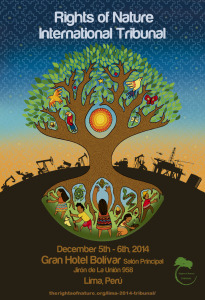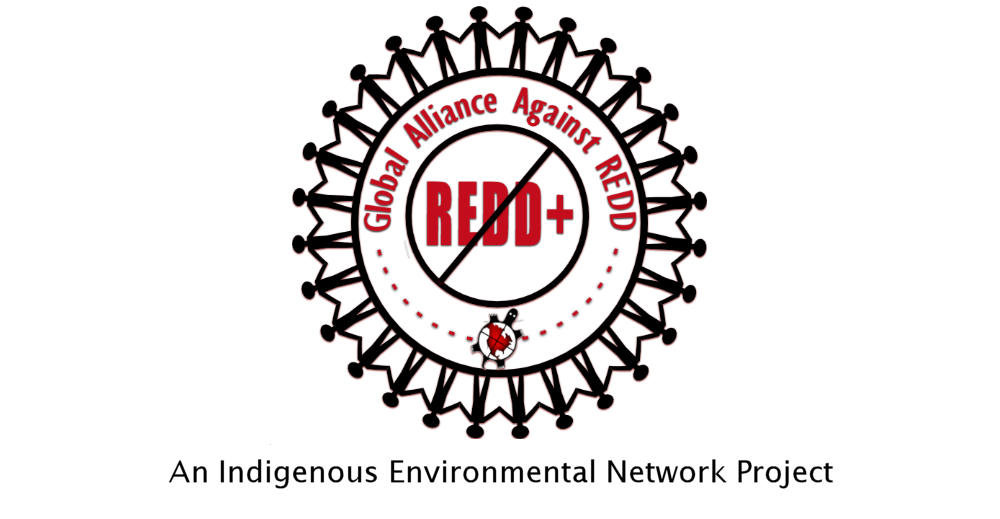“As long as nature is seen as property in law, there can be no justice for communities, the climate or nature”
 The International Tribunal for the Rights of Nature took place on 5 and 6 December 2014 in Lima. On trial were corporations, the United Nations, and government. Cases included mining in Peru and Ecuador, oil extraction in Ecuador, the Belo Monte dam in Brazil, fracking in Bolivia and the USA, BP’s Gulf of Mexico oil spill, damage to the Australian Barrier Reef. And REDD.
The International Tribunal for the Rights of Nature took place on 5 and 6 December 2014 in Lima. On trial were corporations, the United Nations, and government. Cases included mining in Peru and Ecuador, oil extraction in Ecuador, the Belo Monte dam in Brazil, fracking in Bolivia and the USA, BP’s Gulf of Mexico oil spill, damage to the Australian Barrier Reef. And REDD.
The judges referred to the Rights of Nature and the Universal Declaration of the Rights of Mother Earth, from the World People’s Conference on Climate Change and the Rights of Mother Earth in Cochabamba, Bolivia in 2010.
The president of the tribunal was Alberto Acosta, former president of the Constitutional Assembly of Ecuador. Acosta said,
“As long as nature is seen as property in law, there can be no justice for communities, the climate or nature.”
The case against REDD at the Tribunal is explained here:
REDD (Reducing emissions from deforestation and forest degradation) is a global initiative to create a financial value for the carbon stored in native forests and tree plantations, soils and agriculture, including plankton and algae in the oceans. This involves the opening of the carbon cycling capacity of the Earth to economic valuation and trading in financial market systems. Indigenous peoples, forest dwellers, small farmers and peasants view REDD as a false solution for mitigating climate change that have resulted in land grabs, evictions and human rights abuses. REDD is inherently about commodifying and privatizing air, trees and land by selling nature and air to generate permits to pollute. These permits to pollute also known as carbon or emission credits are used by polluters to avoid reducing greenhouse gas emissions at source. This Tribunal on REDD and forests will listen to testimonies on the concern of REDD and other carbon and emissions trading and offset regimes violating the rights established in the Universal Declaration of the Rights of Mother Earth.
Mary Lou Malig of the Global Forest Coalition spoke against carbon markets:
“[They’re] basically a mechanism to cheat. It’s about enabling you to pollute. Instead of cutting your emissions, you increase them and pretend to reduce by offsetting.”
Ninawa Kaxinawá, president of the Huni Kui people in Acre, Brazil spoke out against REDD. “Nature has no price. It’s our forest, it’s our food, it’s our spirit.”
In an interview with Democracy Now, Ninawa explains that REDD prevents communities from fishing on their own land and from practising agriculture. He says that, “leaders are being criminalized for opposing the project, and communities are told that the services provided for education or transportation or healthcare will be suspended if they oppose the project.” Ninawa has received death threats for opposing REDD.
Amy Goodman of Democracy Now asked Ninawa how REDD affects his community. Here’s his reply:
The first impact is that the state of Acre is one of the first states in the world that is promoting REDD, and it is the first state of the Brazilian Amazon that is doing REDD. And it has already violated Convention 169 of the International Labor Organization, which guarantees indigenous people’s right to free, prior, informed consent and the right to say no to projects that affect us. So, Brazil is violating Convention 169, because indigenous peoples have not been consulted about REDD and it is moving forward.
The second impact of REDD is that it has divided indigenous leaders, who before were united to defend the territories and Mother Earth.
A third impact of REDD is that it has resulted in the co-optation of some leaders who have accepted money and bought cars with that money, and they don’t even know where that money is from and what it means.
Another impact is that the government of Brazil, because it is opening its doors to this carbon-offset mechanism, is that it’s gutting the laws and the legal framework on indigenous people’s rights and the guarantees that have been enshrined to protect our rights to our territories.
You can watch the full interview here:
Cassandra Smithie, a translator and interpreter, and Ivonne Yanez of Oilwatch presented evidence against REDD. Here’s how the Guardian reported Smithie’s contribution:
Casandra Smithie went even further, citing a whole series of peoples who have struggled against, or have been threatened by, Redd and calling it a “crime against Mother Earth, Father Sky, and humanity.” The key perpetrators, she noted, such as the UN, the World Bank, extractive industries, multilateral banks, chemical companies, governments and stock exchanges, all have their headquarters in the industrialised northern countries.
“[Redd gives] permits to pollute,” Smithie told the Tribunal. “[It means] forests of the world acting as a sponge for northern industrial countries’ pollution. They can pollute if they grab forests in the global south.”
